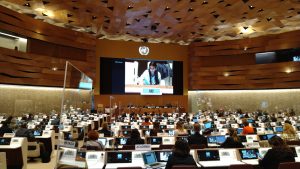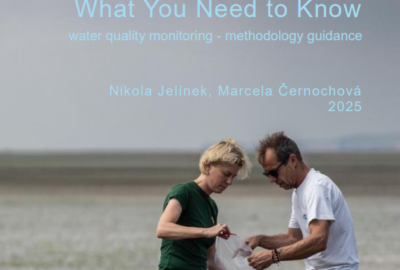
Belarus has been persecuting environmental activists and should stop this violation of international law. The Seventh Meeting of the Parties (1) to the Aarhus Convention (2) confirmed an investigation report of its Compliance Committee (3), (4). Moreover, a new Rapid Response Mechanism to help the people involved in possible future cases was adopted (5). The Geneva Declaration (6) calls on states not to restrict civil liberties, something which has become increasingly common in recent years in the whole UNECE region (7) – among other things in the guise of measures against the COVID pandemic (8), (9).
“It is extremely important for organizations and individuals in Belarus that the states of the Aarhus Convention have defended us against systematic persecution by the state. It proved that the treaty fulfils its purpose. The decision will perhaps also help to protect those who are persecuted and to find justice for them,” says Marina Dubina, director of Ecohome, a non-governmental organization that was recently liquidated for “cooperation with foreign agents”.
The way to the decision was not easy. For the first time in twenty years of history, the Aarhus Convention was voted on. Until now, all opinions were adopted by consensus. This time, however, Belarus refused to accept the findings of an independent investigation of the Aarhus Convention Compliance Committee. Although it seemed it would remain alone for a while, it was eventually supported by Armenia, Kazakhstan, and Kyrgyzstan, as well as Moldova, which abstained.
“In the UNECE region, an axis of countries closing their eyes to the trampling underfoot of human rights emerged. They may not have a clear conscience and want to insure themselves in case their treatment of their own citizens becomes the subject of an international investigation. It is quite possible that activists in these countries are already being persecuted, even though specific cases are not thoroughly documented,” Martin Skalsky, of the NGO Arnika, based in the Czech Republic, states.
Because of the Belarusian case, the countries of the UNECE region adopted what is called a Rapid Response Mechanism that should effectively help people who might come under similar pressure in the future. The Aarhus Convention should soon appoint a Special Rapporteur dealing with particular cases and negotiating with the governments.
Notes and details:
(1) Seventh Meeting of the Parties to the Aarhus Convention.
(2) The Aarhus Convention, also known as the Convention on Environmental Democracy, entered into force on 30 October 2001. Among its 47 signatories are the countries of Europe and the former Soviet Union and the European Union as a party. Recently, Guinea Bissau became the first party from Africa. Based on the example of the Aarhus Convention, the countries of Latin America recently adopted a similar Escazu Convention. The Aarhus Convention guarantees the right to environmental information, public participation in decision making, access to justice, and protection of defenders of the environment from persecution. More on Aarhus Convention.
(3) After political opposition and the media, the Belarusian dictator is shutting down NGOs.
(4) Chronology of the liquidation of the non-governmental organization Ecohome.
(5) The year 2020 showed the highest number ever of defenders of the environment and land killed; 227 people worldwide. Although most of them were in Latin America, in 2019 murders also occurred in Kazakhstan and Romania. Read more here.
(7) Cases of persecutions of environmental activists in Europe and the former Soviet Union.






